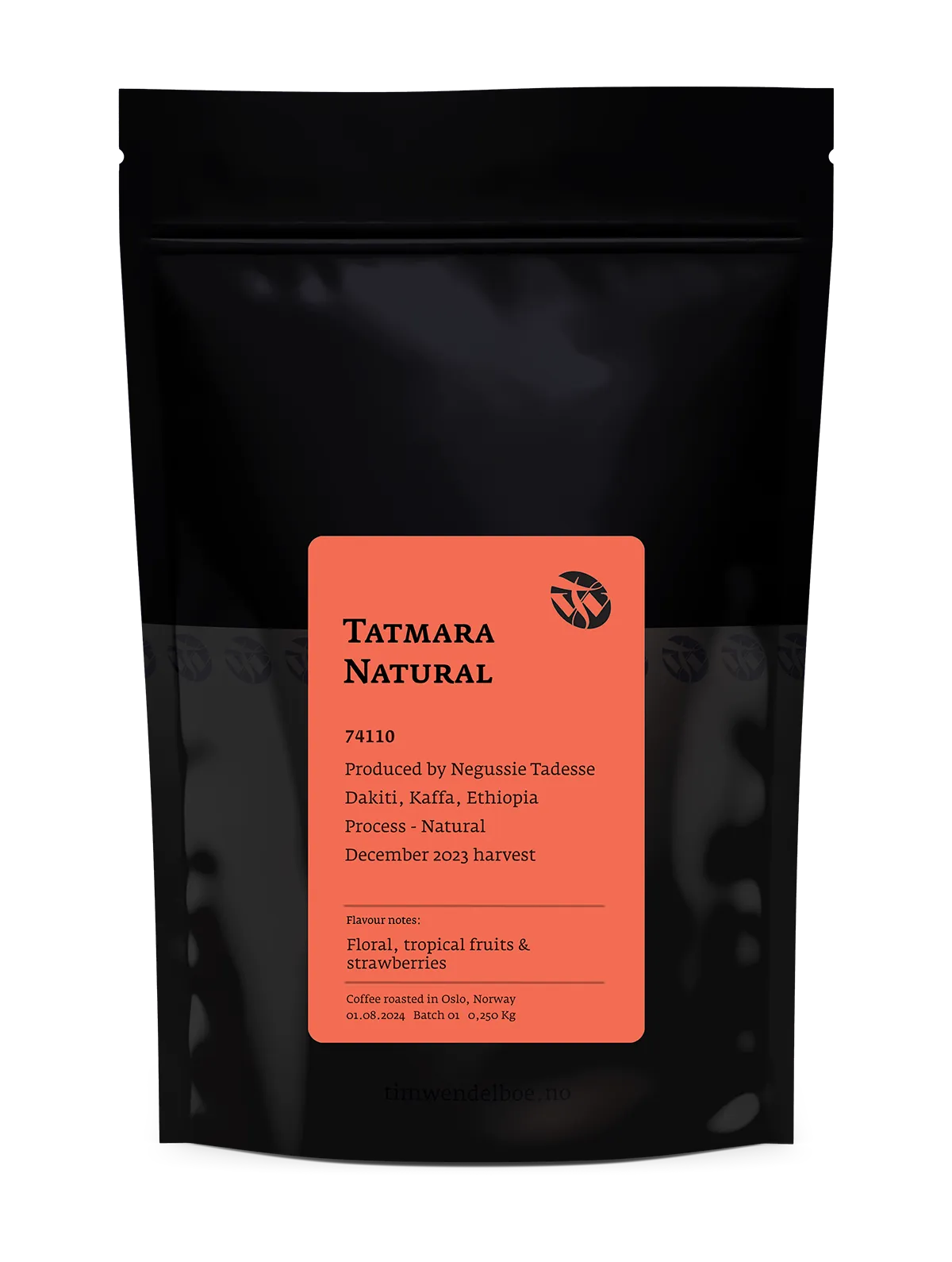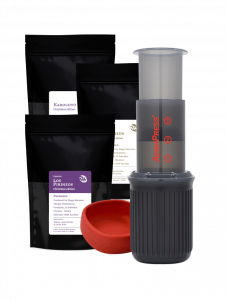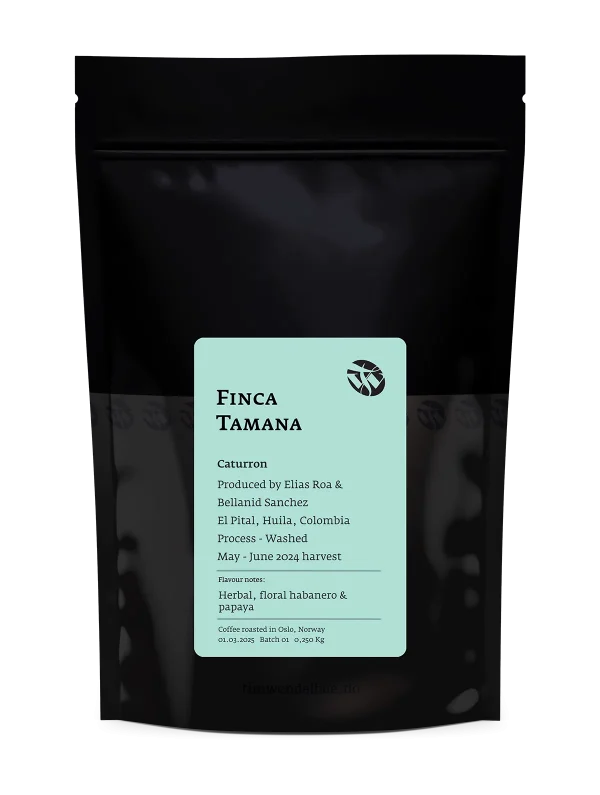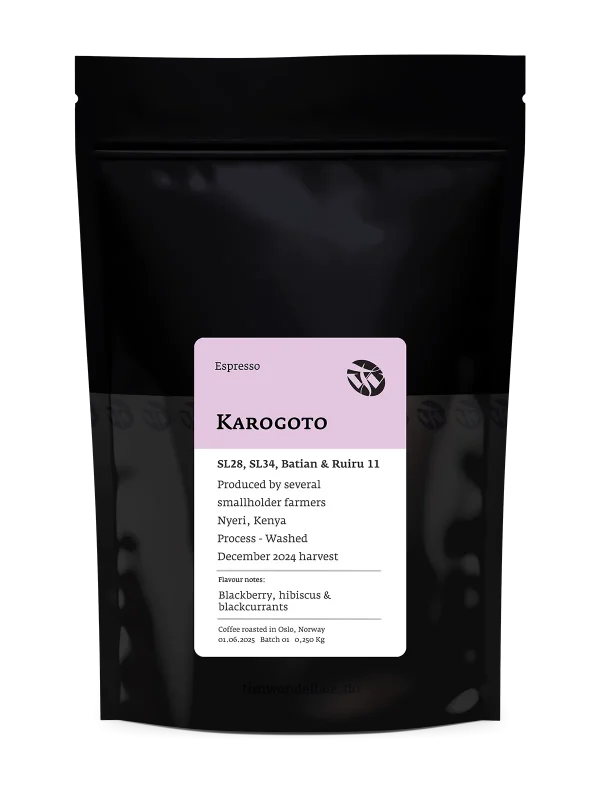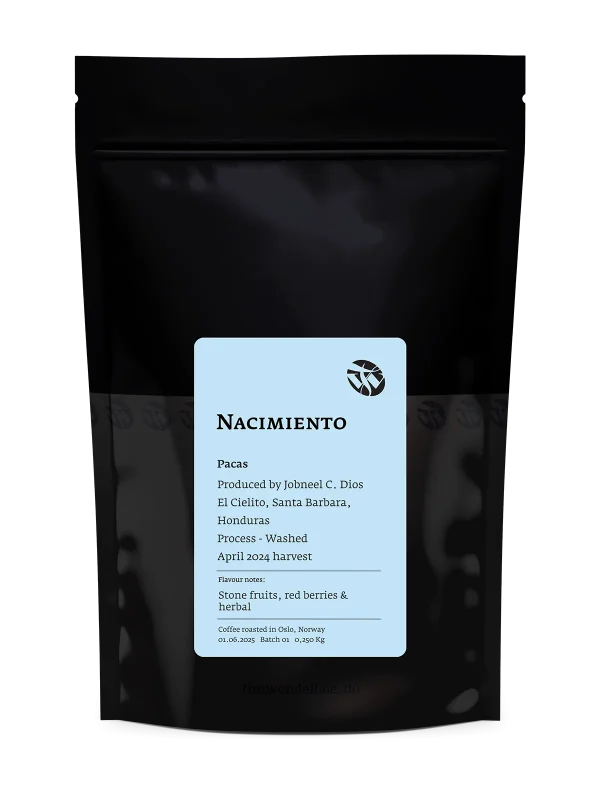| Cultivar | 74110 |
|---|---|
| Flavour Notes | Floral, tropical fruits & strawberries |
| Producer | Negussie Tadesse |
| Country | Ethiopia |
| Region | Dakiti, Kaffa |
| Process | Natural |
| Harvest | December 2023 |
| Roast Profile | Light Roast |
| Contents | Whole Coffee Beans |
| Bag Size | 250g |
Tatmara Natural
kr215.00
A beautiful example of a natural processed coffee with complex fruity flavours from fermentation along with expressive floral notes from the cultivar.
Out of stock
Additional information
Tim's Notes
Tatmara is one of the most beautiful coffee plantations I have ever been to. The coffee grows inside a forest full of old native trees, spice plants, shrubs and wildlife. Negussie does not apply any mineral fertilisers or agrochemicals to his farm and weed control is done manually. Still the trees are healthy and producing well which is most likely due to the healthy forest soils that are rich in soil biology that provide the trees with nutrients. I personally believe that these coffees are so complex, full of flavour and easy to extract not only because of the cultivar that are grown but because they grow slowly under shade trees in very healthy soils in their native environment. (After all the arabica coffee trees are native to the forests of Kaffa. )
Of course the natural process also contributes with extra complexity and fruity flavours but as you may know I am normally not the biggest fan of natural processed coffees. This is because they are really difficult to produce well, especially in regions that have rain showers during the harvest like in Kaffa.
I often find that natural processed coffees have overpowering «funky» flavours of fermented fruit due to uncontrolled fermentation during drying. However, I do like very clean and precise natural processed coffees and when done well with the right cultivars they can taste very juicy and fruity in a refreshing way. The coffees from Tatmara is a good example of a natural processed coffee that I really like. Negussie has been trained by the Belco team on how to process and dry the coffees and the results is a really clean and tasty natural processed coffee with ripe flavours of tropical fruits and strawberries.
Like last year the coffees from the 2023/24 harvest have a subtle “natural processed” flavour profile. I believe it is due to the dry weather conditions during the harvest that made drying more efficient and also because Negussie has built more drying tables and has more drying capacity on the farm. It means that he can dry the coffee cherries in very thin layers on the raised beds which makes the cherries dry faster. A more efficient drying stops the spontaneous fermentation inside each coffee cherry before it can influence the flavour of the coffee too much. This makes the coffee taste less fermented and maybe more similar to a honey processed coffee.
For this harvest we also asked Negussie to separate every single daily picking and to store them separately in air tight grain pro bags after they were finished drying. By doing this we were able to taste through all the daily pickings and reject the few lots that had issues with quality. Instead of bulking everything together, we decided to blend the lots that had similar qualities and of the same cultivar.
Negussie has also invested in a dry mill to remove the husks from his naturals before they are transported to the dry-mill in Addis Ababa. That means he has better control and can speed up his logistics which also helps preserve the quality of his natural processed coffees. We were able to mill Negussie’s coffees on a better dry mill and vacuum pack the coffees for the first time this year which means they taste better and fresher than ever before.
Of course the natural process also contributes with extra complexity and fruity flavours but as you may know I am normally not the biggest fan of natural processed coffees. This is because they are really difficult to produce well, especially in regions that have rain showers during the harvest like in Kaffa.
I often find that natural processed coffees have overpowering «funky» flavours of fermented fruit due to uncontrolled fermentation during drying. However, I do like very clean and precise natural processed coffees and when done well with the right cultivars they can taste very juicy and fruity in a refreshing way. The coffees from Tatmara is a good example of a natural processed coffee that I really like. Negussie has been trained by the Belco team on how to process and dry the coffees and the results is a really clean and tasty natural processed coffee with ripe flavours of tropical fruits and strawberries.
Like last year the coffees from the 2023/24 harvest have a subtle “natural processed” flavour profile. I believe it is due to the dry weather conditions during the harvest that made drying more efficient and also because Negussie has built more drying tables and has more drying capacity on the farm. It means that he can dry the coffee cherries in very thin layers on the raised beds which makes the cherries dry faster. A more efficient drying stops the spontaneous fermentation inside each coffee cherry before it can influence the flavour of the coffee too much. This makes the coffee taste less fermented and maybe more similar to a honey processed coffee.
For this harvest we also asked Negussie to separate every single daily picking and to store them separately in air tight grain pro bags after they were finished drying. By doing this we were able to taste through all the daily pickings and reject the few lots that had issues with quality. Instead of bulking everything together, we decided to blend the lots that had similar qualities and of the same cultivar.
Negussie has also invested in a dry mill to remove the husks from his naturals before they are transported to the dry-mill in Addis Ababa. That means he has better control and can speed up his logistics which also helps preserve the quality of his natural processed coffees. We were able to mill Negussie’s coffees on a better dry mill and vacuum pack the coffees for the first time this year which means they taste better and fresher than ever before.
Cultivar
Negussie has mainly planted two different cultivars named 74110 and 74112 on his farm that he separates when picking and processing his coffees. Both cultivars are selections made by the Jimma Agricultural Research Center (JARC) and although they have very similar qualities, there are some subtle nuances in the flavour profile. The two cultivars begin with the number “74” that indicates their cataloging and selection in 1974.
The 74110 cultivar was selected from an original “mother tree” in the Bishari village of the Metu Province in the Illuababora zone. After research in their field laboratory (coffee farm) in Jimma, the JARC researchers found the cultivar to be resistant to coffee berry disease and to have a high yield potential. JARC released the cultivar in 1979 as a new and improved cultivar and since then it has become one of the most popular cultivars in Ethiopia known for its floral and citric flavour profile.
Cultivar 74112 also originates in the Metu-Bishari forest and was similarly released in 1979 for its resistance to coffee berry disease and high yield potential. Like the 74110 it is also among the most commonly planted cultivar in Ethiopia today, especially on recently established farms in the southern, southwestern and western coffee-growing parts of Ethiopia.
(Source: "A Reference Guide to Ethiopian Coffee Varieties" by Getu Bekele and Timothy Hill. G Broad Trading PLC, Addis Ababa, Ethiopia / Counter Culture Coffee, Durham, NC, USA, 2018.)
The 74110 cultivar was selected from an original “mother tree” in the Bishari village of the Metu Province in the Illuababora zone. After research in their field laboratory (coffee farm) in Jimma, the JARC researchers found the cultivar to be resistant to coffee berry disease and to have a high yield potential. JARC released the cultivar in 1979 as a new and improved cultivar and since then it has become one of the most popular cultivars in Ethiopia known for its floral and citric flavour profile.
Cultivar 74112 also originates in the Metu-Bishari forest and was similarly released in 1979 for its resistance to coffee berry disease and high yield potential. Like the 74110 it is also among the most commonly planted cultivar in Ethiopia today, especially on recently established farms in the southern, southwestern and western coffee-growing parts of Ethiopia.
(Source: "A Reference Guide to Ethiopian Coffee Varieties" by Getu Bekele and Timothy Hill. G Broad Trading PLC, Addis Ababa, Ethiopia / Counter Culture Coffee, Durham, NC, USA, 2018.)
Process
Picking
- Ripe coffee cherries are hand picked by local pickers and delivered to the farm in the afternoon.
- The coffee cherries are placed directly on elevated drying tables where they get dried in a thin layer. The cherries are constantly moved the first days to make sure they do not over ferment. All over-ripe and slightly under-ripe cherries are removed by hand during drying to ensure only the fully ripe coffee cherries are dried together. During daytime the coffees are raked to ensure even drying and to prevent undesired fermentation from occurring. The drying process takes about 10 – 20 days depending on the climate and is finished when the moisture content in the coffee beans is between 10-12%.
- Once the cherries are finished drying, they are de-hulled before the coffee beans are transported to the mill where they get cleaned and sorted before packaging for export. The coffee was packed, exported and stored in jute bags with a grain pro bag liner.
Shipping
For our Norwegian customers, we offer three shipping options:
- Pakke i Postkassen - With Pakke i Postkassen, tracking is provided, and delivery is estimated within 2-3 business days.
- Pakke til hentested - The parcel can be collected from a Post in Store, Post Office, parcel locker, or parcel box. This option includes tracking, with delivery expected within 1-5 business days.
- Norwegian Post, No Tracking (Brevpost) - This option does not offer tracking. Delivery is estimated within 2-5 business days.
How To Brew
Filter
- We strongly recommend using the correct measurements and brewing techniques when you brew our coffees. Use a digital scale both to measure water and coffee in order to get consistent results, and we recommend using between 60 to 70 grams of coffee per litre (1000g) of water, depending on the brewing method, water quality and coffee used.
- We strongly recommend using VST filter baskets. Both the 18g, 20g and the 22g basket is great for our coffee. The VST filters makes it a lot easier to extract the espresso properly which gives a lot more sweetness in the cup. They are also more or less identical to each other which makes it easy to be more consistent when brewing on several groups at the same time. You can buy the filters on our webshop, just make sure they fit your machine (ours fits all La Marzocco machines and machines with 58mm filter baskets). With the VST 18g filter basket, we recommend the following brewing parameters: 18-19g freshly-ground coffee, 25-35s brewing time, 35-38g of final brew liquid in the cup, 93°C-94°C brew water temperature.
Tatmara
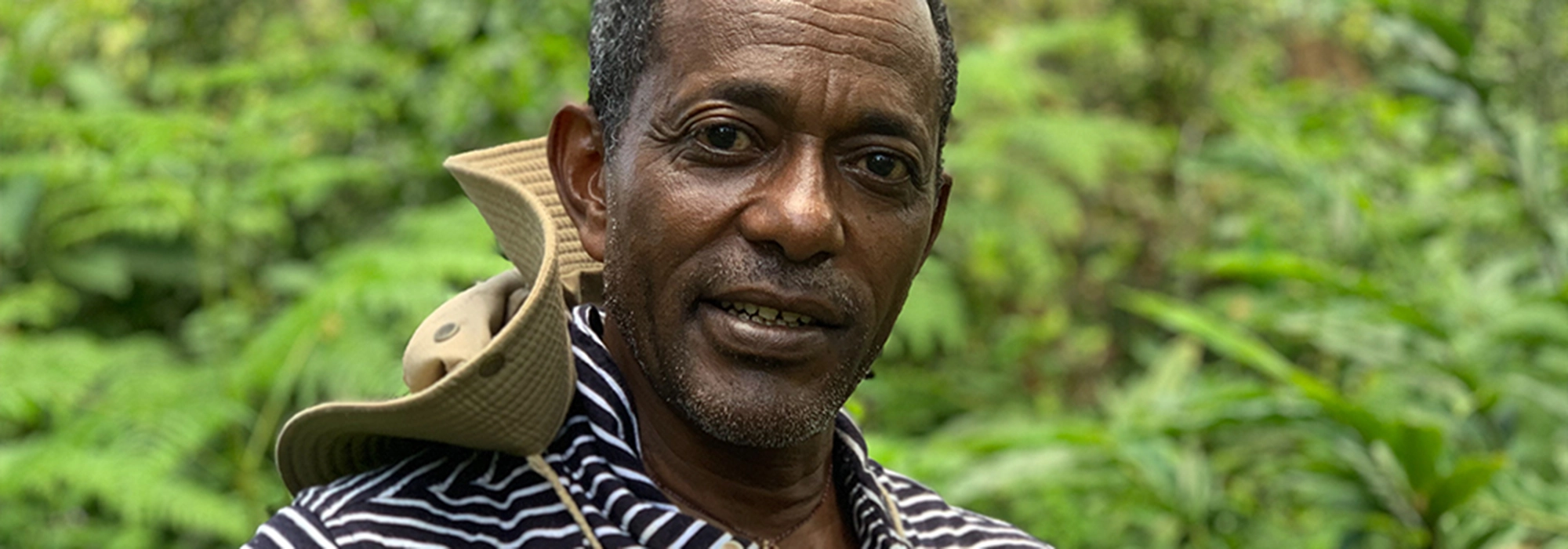
The Tatmara Coffee Plantation is situated near Bonga, the capital city of Kaffa in Ethiopia and owned by Negussie Tadesse. A few yers ago Ethiopia opened up for smaller farmers to sell coffee directly to roasters. When that happened, I immediately contacted the French import company Belco to see if they could help me get in touch with some farmers I could possibly start working with and buy coffee from. After a week of traveling in the areas of Jimma and Kaffa there were a few farms that stood out for me and one of them was the Tatmara Coffee Plantation and the farmer Negussie Tadesse.
Negussie was already separating his coffees by cultivars but was only producing natural processed coffees due to not having infrastructure to wash coffees yet. He had a very open mind and wanted to work with quality so I decided to at least get started by buying some natural processed coffees.
In 2022 we held a fund raiser during our 15 year anniversary and collected money that we donated to Negussie in order to fund the construction of a new wet mill on his farm. The wet mill was completed in October 2023 and we have since then been able to buy delicious washed coffees in addition to the natural processed coffees from Negussie.
Learn More About Tatmara
Transparency
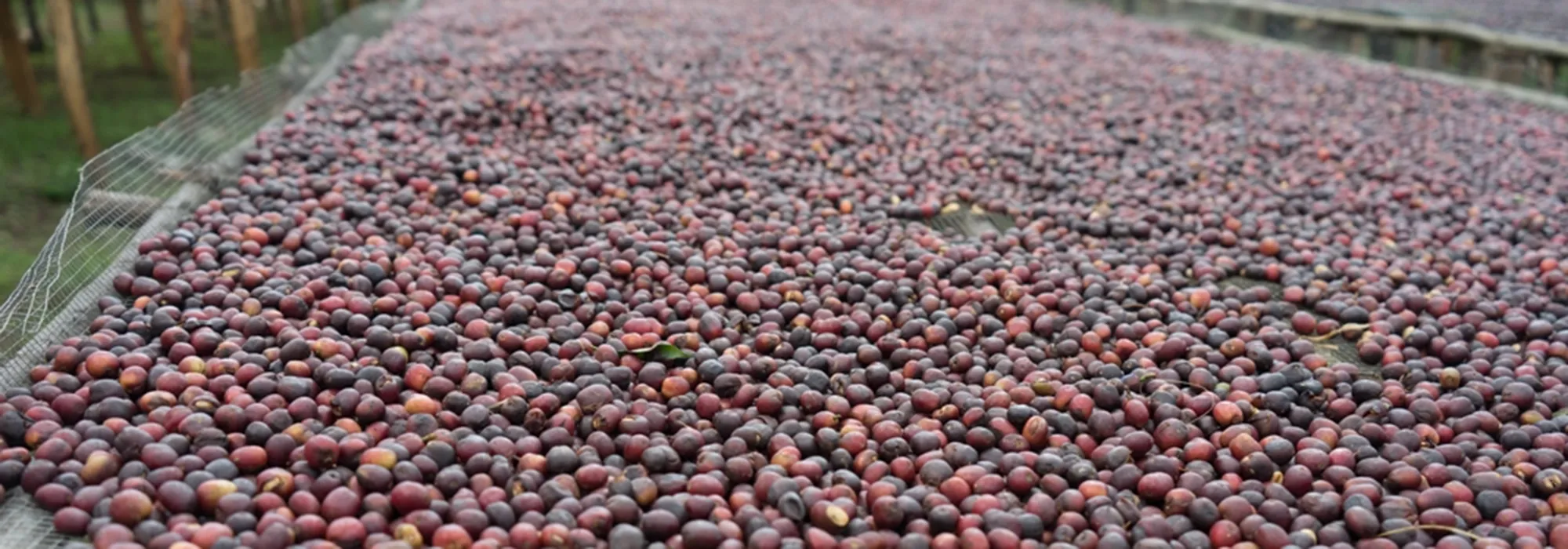
We met Negussie through the French import company Belco and have visited his farm several times since then together with the Belco team. It is our third year buying coffee from Negussie and although it has been challenging we have had great support from Belco who have been assisting both Negussie with knowledge and quality control as well as helping us with logistics, milling and communication. We are currently paying USD 5,00 per lb F.O.B. for the green coffee to Negussie and milling and transportation inside Ethiopia was paid by him as he is a coffee exporter. Belco added their margin to cover their expenses for helping us move the coffees and communicating and organising logistics with Negussie and assisting him during harvest.
Learn More About Transparency

